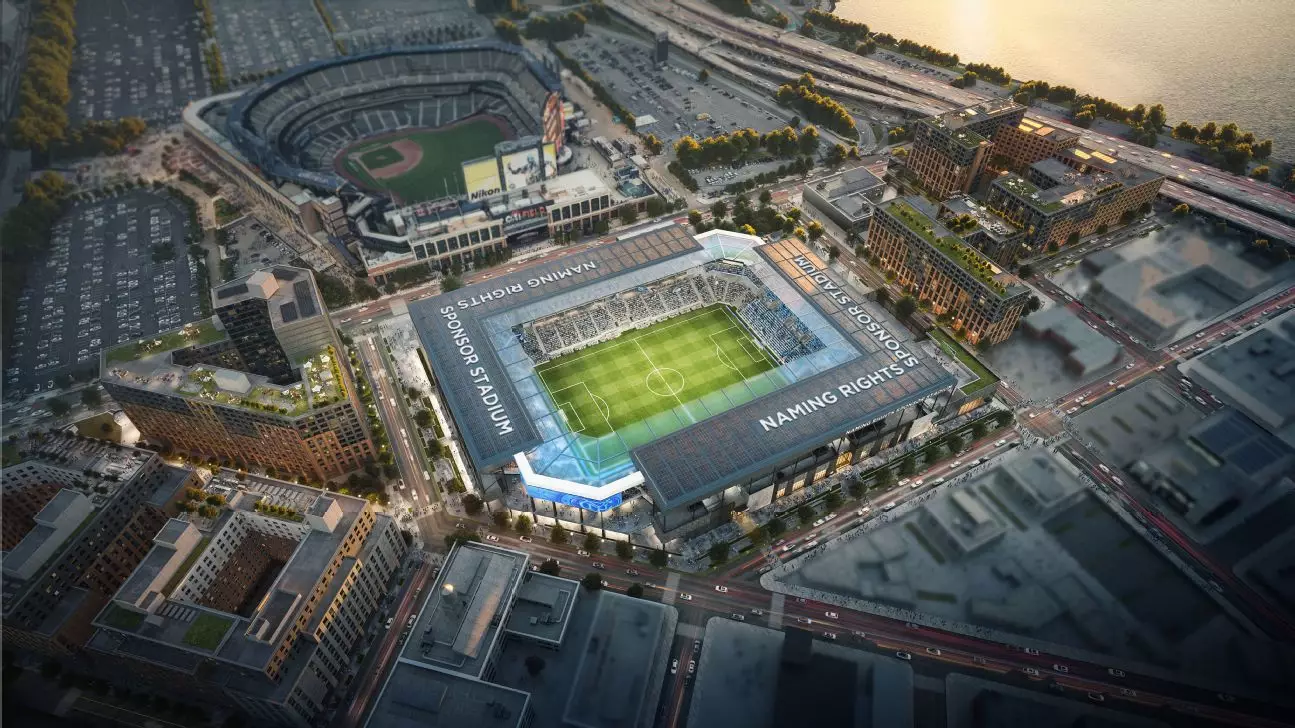In a significant move for Major League Soccer (MLS) and New York City FC (NYCFC), plans for a brand-new stadium have been unveiled, solidifying the club’s future in New York City. The proposed $780 million stadium, set to accommodate 25,000 fans, will be located next to Citi Field, the home of the New York Mets, with its grand opening slated for 2027. This groundbreaking initiative comes with a 20-year naming agreement with Etihad Airways, the national airline of the United Arab Emirates, a partnership that underscores the global ambitions of both the airline and the soccer club. The implications of this agreement stretch far beyond mere branding; they offer insight into the evolving nature of sports partnerships in a city characterized by its diverse and dynamic market.
The Role of City Football Group
As the controlling partner of NYCFC, the City Football Group (CFG) brings experience from its successful management of renowned teams such as Manchester City. The latter has enjoyed lucrative sponsorships and a unified brand identity, evident in their Etihad Stadium, named in honor of Etihad Airways back in 2011. Despite the parent company’s entanglement in a financial fair play investigation by the Premier League, Brad Sims, the president of NYCFC, emphasized the autonomy of the franchise. “It’s a 100% New York City FC deal,” he stated, reiterating that the revenue from this partnership will predominantly benefit the MLS team rather than CFG or Manchester City. This distinction is crucial in establishing NYCFC’s independent identity in the crowded New York sports landscape.
The partnership between NYCFC and Etihad extends beyond financial transactions. Etihad Airways has played a pivotal role in community initiatives in New York, establishing itself not only as a sponsor but as a committed partner in the local sphere. This collaboration indicates a strategic interest in the soccer market within the United States, particularly as the sport continues to gain traction in metropolitan areas like New York City. Sims elaborated on the mutual interest, pointing to the strategic importance of engagement in the New York market by stating, “For them, this is a very strategic commercial market.”
Since commencing their inaugural season in 2015, NYCFC has faced logistical hurdles due to the unavailability of a dedicated soccer stadium. Primarily utilizing Yankee Stadium, the team has also played in Citi Field on occasion due to scheduling conflicts, an alignment reminiscent of a sibling rivalry given the proximity of the two franchises. As NYCFC prepares to transition into its new home, it is essential to consider the cooperative scheduling needed with the Mets and even with events like the U.S. Open. Sims highlighted the necessity of buffer periods between events, ensuring smooth transitions and maximum fan engagement.
Implications of the Stadium’s Construction
The construction of Etihad Park is intertwined with a broader redevelopment project in Willets Point, which promises to introduce 2,500 housing units alongside retail and community facilities. This redevelopment is more than just an urban facelift; it embodies a vision for a vibrant, integrated live-work-play environment. As NYCFC navigates the landscape of New York sports, the creation of this new stadium represents not only a physical structure but an essential investment in the community’s future.
The evolving structure of the MLS season—which currently operates from February to December—has raised discussions about aligning with the traditional August-to-May calendar prevalent in the majority of European leagues. Sims expressed optimism about the new stadium’s ability to accommodate such a transition, emphasizing the long-term benefits that a revised schedule could provide for fan engagement and team performance. The prospect of utilizing modern stadium facilities while possibly minimizing weather-related challenges presents a favorable scenario for NYCFC’s aspirations in professional soccer.
Looking Ahead: The 2026 World Cup
The fast-approaching 2026 World Cup, set to be hosted by the United States, is a pertinent focal point for NYCFC. With plans to provide its season-ticket holders and corporate partners presale access to hospitality tickets, the club is strategically positioning itself as a vital participant in the global soccer narrative. As the World Cup draws near, the excitement surrounding Etihad Park and its offerings promises to elevate NYCFC’s standing not only in Major League Soccer but on the international stage.
The partnership between NYCFC and Etihad Airways signals a new chapter for soccer in an increasingly competitive market. With its commitment to community engagement, strategic planning, and adaptability to the ever-evolving landscape of sports, NYCFC is poised to make a remarkable impact on both local and international fronts. The anticipated opening of Etihad Park will serve as a testament to the club’s resilience and vision, enriching the fabric of New York’s sports community while laying the groundwork for future success.

